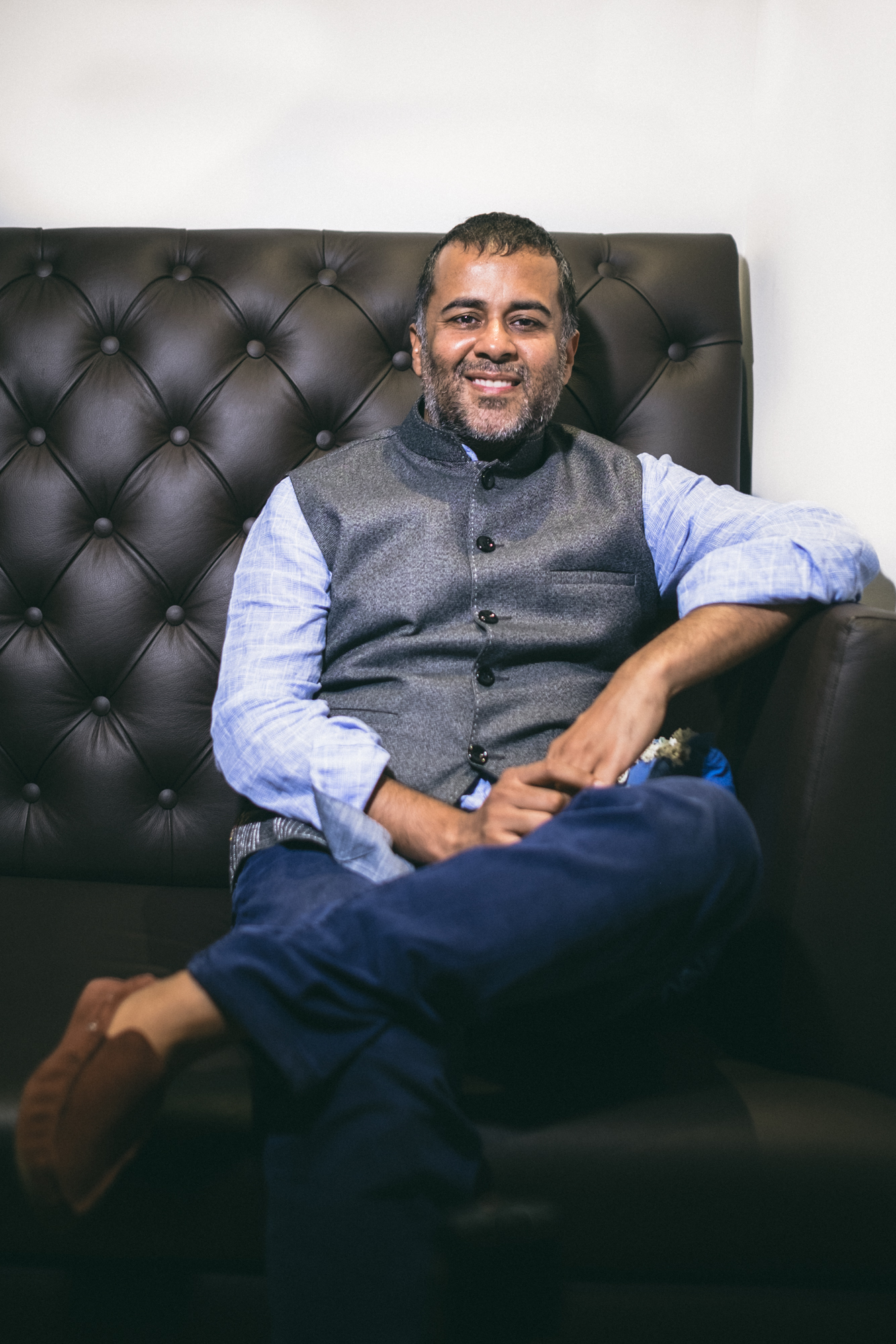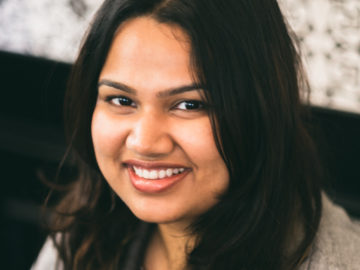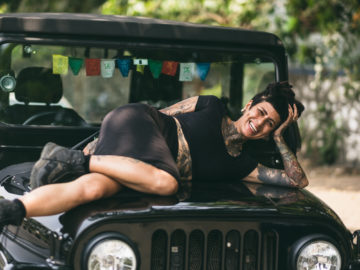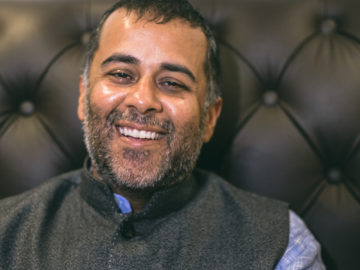What made you choose Five Point Someone as the story you wanted to go with? Why was that your first story?
I think that was my first and only innocent story because I was not famous then.
I try not to be corrupted by that but somewhere down the line I am very aware that people are going to read this. But that time I just wrote whatever I felt I was comfortable with. At that time IITs used to be mentioned in very hallowed terms in our news headlines and that is all people used to talk about; IITians as the achievers, Silicon Valley startups etc. I felt that nobody was talking about the underbelly of IITs and the underbelly is the people who don’t perform so well. In every elite college as well, somebody has to come last so those are the five point someones and I thought that will make a very interesting take on IITs and will be amusing for people to read, that that also happens at IITs. My experience at IIT was very different from what used to come in the papers. It was hostels and drinking and professors’ daughters and things like that. I was like this never comes out, so maybe let me try and write this.
You were not a writer you were a banker. How hard was it to write the first book?
I became a banker, but before that in my student days I always used to write. Not books but dramas & plays. I used to write articles. There was always this story telling thing in me. So I think it was just about tapping into that hobby of mine. I felt like most of my friends once they started working, they all gave up their extra curricular activities and so did I. They would just be busy in their jobs. I didn’t have that many talents apart from writing and that’s the thing I used to enjoy doing. The good thing about writing is you can do it anytime anywhere. You need a golf course, to play golf, but for writing you don’t need all that. So ya, I just reawakened the writer in me. It wasn’t like a banker turned into a writer; banker came later, I wasn’t born a banker.
You have a knack for dialogues. How are the dialogues just the way we speak? You weren’t living here at that point in time, how did you capture this?
I guess I have a good ear. To write dialogue I have to first listen to dialogue well and I am able to express it. A lot of people when they write, suddenly their vocabulary changes, but for me I can listen absorb and write it as it is supposed to be expressed. I get a lot of criticism for it as well. Because dialogue is how people talk and often people talk in a colloquial way, where maybe the English is not even correct and they make the mistake that the way my characters are talking, that’s how my English is. But that’s not true, you know if Madhav Jha in Half Girlfriend writes a book he will use very simple English. But I find that it is one of the strengths. Maybe because I used to write plays, which were mostly all dialogue. A lot of my books have a lot of dialogue, maybe that’s what lends them so well to films.
You know if I write in a way how, say some purists want me to write or how their English literature professor told them to write, it will feel unreal. When you are reading the book you will feel people like these don’t exist.
So then you will not believe the story. You’ll not get absorbed, you will not get emotional about the story.
Your books are wildly popular but you are not exactly a stranger to haters, what’s the biggest, weirdest insult you think you have received?
Oh, there are all kinds. Really, I mean people would wish me dead. I don’t know, the Internet is a nasty place. I think what’s important for us is to not give trolls the attention, apart from the fact that sometimes it’s amusing and fun. If it’s coming from a credible person, then it’s okay. But if some random people are trolling and then if in an interview you start asking, ‘what do you want to say about the trolls?’ Then it’s kind of giving trolls more importance than they deserve, because who are they? If you are walking on the road and someone starts shouting, you are gonna report that, it’s the same thing. So that’s the troll side of things, if you ask about the nastiest, that comes from the troll brigade. But if you ask about criticism, like I told you a lot of people don’t like the colloquial language, they don’t like that I write popular stories, or that my characters are from everyday life. My books don’t look like classics that they have studied in their English literature course and for them that are literature. 200-year-old books can only be called literature or certain writers who are more intellectual in their language can be called literature. For them I am too much of a populist, I write too simple. And maybe it’s true, that’s not their taste.
If you eat sushi you can say, ‘what is this roti subzi?’ But the fact is, more people in India eat roti subzi than sushi, so I’m very happy making that.
So it’s a bit like that, it’s not like they are wrong. Those people are fine; they have a taste for that and they are bored of roti subzi now.
How do you stay so calm?
I think it’s experience, overtime. Initially I was like how can you say that about my writing. Now it doesn’t matter. The only thing is that I don’t like to encourage troll behaviour, I don’t like to further give them credence. I think I am secure about my place. I want to do good work, I want to stay relevant, there are a lot of challenges I have. I am getting older, I have to come up with new stories and they all have to be about India, they all have to be middle class, they all have to be fun, they all have to be something I haven’t done before. So it’s harder and harder to keep coming up with new things. I’d rather focus on those things, which are genuine challenges I have than noise.
I mean which wildly popular person, you have called me that I am not calling myself that, doesn’t have haters and trolls? I mean Rihanna has it, Beyonce has it, Obama has it, Shah Rukh Khan has it and so it’s fine.
You said you are trying to keep yourself relevant, how are you doing that?
By staying in touch with all the changes that are happening in our country, the millennial generation. Trying to look at them, not judge them.
How hard is that?
It is hard, it is hard. I am trying to tell myself it is okay to post 20 Boomerangs a day, I mean you know maybe that’s what life is about. It’s okay to stop reading books and stop doing meaningful things, to just keep posting selfies on social media. We are living in a time where people have suddenly seen a change in technology of communication – mass communication, social media and personal communication using Whatsapp, things like that. It’s a huge change, you can send videos, make video calls, all kind of things. So understanding all that. In Half Girlfriend, the movie there is a lot more Whatsapp and selfies, which is not there in the book because at that time they were not so popular. And so one is keeping abreast. These patterns in society, these half relationships weren’t there 10 years ago when I had written Five Point Someone, I don’t think the concept of Half Girlfriend would have been as well understood or you know people would have empathized with it as much. So all those things really, just trying to stay in touch with the technological, psychological and sociological changes in our society.
In an earlier interview too you spoke about getting older, so is that a big worry, of losing relevance? You aren’t that old anyway.
I am still 43, and one thing I’ve done early on is grow my beard, which basically is that I live my age, I’m not chasing it and there is no intention. You don’t have to be relevant as in to come across as young, like the Prime Minister is 65 year old but he connects with the youth, Amitabh Bachchan is 70+ and he still is relevant. Because he knows, he switched to twitter very early and he changed the kind of films he does. He is doing films like Pink now, whereas he’d do a Sooryavansham ages ago. Age has got nothing to do with it. One thing I tried and started doing, maybe 7-8 years ago, I started writing columns on national issues, commenting on national issues apart from my books and films and I also give motivational talks, so all that has come and that’s my aging plan.
I think I can be 60 and write about the budget, but if at 60 I am writing about college romances and Snapchat videos, I think I’ll be like a creepy uncle.
I am co-producing Half Girlfriend that’s also a step. As I get older I could maybe handle more responsibility for a film. So I think the transition will happen automatically, I’ll outgrow what I do and I’ll find something else to do, and I think that all of us need to do that in any career. You need to reinvent. For every decade you need to have different goals, you need to figure out where you want to be in life. What you want at 20 is very different from what you want at 40 and what you want at 60.
Five of your books have been turned into movies, right? So what role do you think an author has in the cinematic retelling of their work?
It really depends on the people who are making the film. I have had films where I have just given the book and basically went once or twice on the shoot and then once to see some trailer and once for some marketing activity and that’s it, three to four times I met the makers and that was Two States and it did very well. Half Girlfriend, they wanted me more closely involved so I am co-producer.
Do you have these pangs when you are not so involved?
No no no. Because I have my book and it is read by millions.
So anybody who wants to see what Chetan wanted to say, even for Half Girlfriend I would say, anybody who wants to see that, go back to the book.
If you want to see how the director saw the book then see the movie. I think both are good but it’s not that I have to tell the director to change so many things.
Do you ever face the conflict that the book is better than the movie?
People say that sometimes. It’s flattering to me, despite of all the effort they were not able to make a movie to match up. But the book will always be better than the film, I feel, because you have your imagination, but in my case people have also liked the films. So I think the aim is to let both of them have their share of appreciators. People will compare, readers will compare. Some may like the book more because of the imagination, but largely we have a case where they say, ‘book was nice, the film was also nice’ and that’s good enough for us.
You are not just a bestselling author you are publicly recognized and famous, so do you think there is a drawback to that?
So I’ll tell you where it’s a drawback. What matters is my celebrity; my personal celebrity sometimes is discussed more than my books. It is not what One Indian Girl is about, rather it is more about who has written it? How can he write about feminism? Who’s written it should be irrelevant. You should look at the book and talk about what the book is trying to say, what it is able to say, what it couldn’t say, that is fine. Discuss the work, discuss Half Girlfriend. But always, I think human interest stories tend to get more attention. So the interest in me as a person is almost as much as my books, which in a way is great because I become my own brand and it is very easy to create buzz. If I announce a book there is buzz about it. Now if there is a movie I will add to the buzz because it’s an adaptation. But it has a downside that it makes the focus on me, rather than what I am trying to say sometimes.
I am in the business of what am I trying to say, I am not trying to make my face famous, it has just become famous.
What according to Chetan Bhagat is feminism?
According to me feminism is when there is no gender discrimination when it comes to opportunities, choices and rights for women. So gender should not be an issue.
To me feminism is not men and women wanting the same things but men and women having the same chance of getting what they want.
Everybody can’t have what they want, but they should have the same probability of getting what they want, equal opportunity in some way in this world.
So what do you think is the problem plaguing feminism in India today? A lot of people have a lot of different views about feminism
See it’s a very difficult issue, it’s like religion, or like nationalism. Moment you say the word, everybody has their own view. And what I noticed is, different women in different parts of the world have their own feminist agendas. A housewife in Indore may say, ‘all I want is women will not cook on Sundays, we want to be taken out to the mall’, that’s feminist, that’s what she wants and then there is a section on Instagram that says free the nipple, that’s what they want. But I think we have to realize that we cannot demean anybody, maybe she is aiming too low, maybe the Indore lady is aiming too low, there can be a lot more she should ask for but that’s what her world is and that’s what she wants. Like in any movement, there is a set of extremists and fundamentalists. And I think in feminism also there are women who say that this is the agenda – and it’s a very strong agenda, it’s not a wrong agenda but it’s a very strong one – and only if you are on board with this agenda then you are a feminist else you are not. So what happens is a lot of women feel alienated. I used to go for my book launches and I’m sure there are videos, I asked, ‘how many of you are feminists?’ 5% raised their hands. 95% of women in India don’t even want to be identified as feminists, which is a big problem. And I think they see feminists as somebody who is very tough. When the book came out the same group of rigid strong feminists said, ‘what is this character? She is not a feminist. She is crying when her boyfriend leaves her. She is begging him to take her back, she can’t be a feminist.’ And I think that’s wrong, she is a feminist that she doesn’t settle, she says I want a career and I want a husband who will accept my career and I’ll be a good mother, I will be that and that’s what I want. And that’s what I think is important to her as a feminist agenda. But that doesn’t mean she is not vulnerable, that doesn’t mean she will not have heartbreak, that doesn’t mean she won’t cry, you know ooh how can you be a feminist you are crying for a guy? Of course you can and you can still be a feminist, that’s my contention, that’s what the book is about. That’s what most Indian girls agree with.
So the issue now is, is feminism, and I am not claiming that I know the answer, but is feminism what democratically a lot of Indian women decide that yes this is the current Indian feminism agenda or is it what a few strong women who write for a couple of websites, who read New York Times and therefore have their own views on it, they decide?
What is feminism, I don’t know. You know more Indian women have read One Indian Girl than their articles. More Indian women have told me that, ‘we liked this girl, it gave us strength. I identify with her.’ Radhika when she goes, she’s very aware of her looks. She thinks am I looking fat, will he think I am… I didn’t wax my legs, but she can still be a feminist and that’s what is my opinion and that’s what most girls in India think. But I have been badgered for it, so I don’t know. I think the group needs to regroup and decide what is our agenda? If you ask for too many things and everything in a strong sort of way, you’re gonna get nothing. World doesn’t change like that. You can just make noise on the Internet, keep making noise. It’s not wrong, but lets have priorities. The moment you are losing mass support for your movement, you need to rethink. Why am I losing mass support, why am I only talking to my facebook bubble and making fun of everybody else? Doesn’t the average girl, the domestic help who comes to my house, she have a say in the feminist agenda?
They have to stand up to the fundamentalists, same way as religion needs to be rescued from the fundamentalists. We cannot let gau rakshaks run the country, I’m not saying the feminists are equivalent of that but you can’t let the fundamentalist agenda rule the narrative.
True change happens when people really sit and talk in reasonable terms and there is a negotiation and it happens inch by inch, it happens one little step at a time and it has happened, I think Indian women are very different today than say 30 years ago or 40 years ago.
I stand for democratizing things. I mean literature now is no longer in the shackles of elitists and obviously the people who controlled it are going to be upset, that I took it away from them. I am writing a novel on feminism that millions of Indians and girls are reading, they are discussing it even if they are saying, ‘I don’t agree with Chetan.’
I have taken feminism, this cool little issue that a certain set of women discuss and would say, ‘you don’t know feminism, it’s okay, we’ll tell you what to do’, I have taken it to the masses.
It’s too important an issue; every woman has to be involved in it. Even if I were not there, the country is changing; everyone has Internet on their phones today. They are learning, they are quickly going to break down these walls that existed because the elite had access to information, to English.
Bharat is rising and we have to accept that.
More talk with Chetan Bhagat coming up next week
This is Part 1 of a two part interview. Read Part 2.
Unspool
Which of the 5 movies made from your books is your favourite?
Kai Po Che. Because it’s really well made and is a very difficult movie about Gujrat riots and very hard to make that convincingly.
A book of yours you wish you hadn’t written.
I don’t regret writing any of my books but my weakest book is One Night at a Call Center
The New York Times has called you ‘the biggest selling English language novelist in India’s history’. Time magazine put you in the ‘100 most influential people in the world’ and FastCompany, USA, listed you as one of the world’s ‘100 most creative people in business.’ If you could only keep one of these titles, which one would it be and why?
I’d obviously like all three because they are three slightly different… I would say I would like to have the influence one. If I am one of the most influential people, that’s what it’s all about anyway.
What books do YOU read? Tell us your favourite 3.
I read all kinds of books. I read one about Pixar, Creativity Inc, recently that’s very good. I am reading, the movie Noor came on this book, Karachi, You’re Killing Me by Saba Imtiaz I am reading that. I don’t have any favourites, Godfather I can see, yea that’s one of my favourites maybe.
This is Part 1 of a two part interview. Read Part 2.






